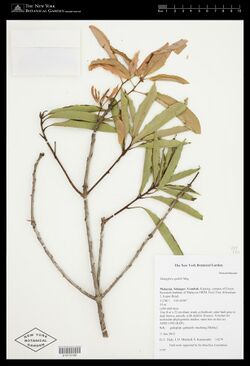Biology:Mangifera gedebe
| Mangifera gedebe | |
|---|---|

| |
| Scientific classification | |
| Kingdom: | Plantae |
| Clade: | Tracheophytes |
| Clade: | Angiosperms |
| Clade: | Eudicots |
| Clade: | Rosids |
| Order: | Sapindales |
| Family: | Anacardiaceae |
| Genus: | Mangifera |
| Species: | M. gedebe
|
| Binomial name | |
| Mangifera gedebe Miq.
| |
| Synonyms[2] | |
| |
Mangifera gedebe is a species of plant in the family Anacardiaceae.[3] In Javanese it is known as kedepir,[4] in Malay repeh,[5] in Sumatra it has been called gedepir, and in Kalimantan kepi.[4] It is a tree, and can grow up to 30 metres tall and up to 60 centimetres diameter, though it usually grows to about 15 metres tall and 45 centimetres diameter at breast height.[6] The elliptic to oblong-shaped leaves are somewhat leathery in texture and 5 to 23 cm in length and 2 to 6 cm in width. The flowers are white, and have five stamens, of which only one is fertile. It produces obliquely subrotund drupes as fruit, these are 8 to 9 cm in diameter and have a thin layer of fibrous flesh. The seeds, like a walnut, have a very irregularly lobed and folded surface.[4]
It grows in lowlands on river banks or in swamp forests. The flowers appear from June to September, the fruits from August to November.[4]
It is sometimes grown locally for the fruit. The drupes are very sour, and they are only edible when unripe, as when ripe the pulp is too scanty and hard.[4]
A 1991 book, based on information from 1985, states that the species is rare and urgently requires conservation in eastern Borneo;[4] in 2014, the species's conservation status on the IUCN Red List of Threatened Species was assessed as 'near threatened'.[1]
References
- ↑ 1.0 1.1 L. Rhodes; N. Maxted (2014). "Mangifera gedebi". IUCN Red List of Threatened Species 2014. doi:10.2305/IUCN.UK.2016-3.RLTS.T20678215A20694841.en. https://www.iucnredlist.org/species/20678215/20694841. Retrieved 15 August 2020.
- ↑ "Mangifera gedebi (MNGGE)[Overview"]. https://gd.eppo.int/taxon/MNGGE.
- ↑ Hai Xuan Nguyen; Loc Thanh Nguyen; Truong Nhat Van Do; Tho Huu Le; Phu Hoang Dang; Hung Manh Tran; Nhan Trung Nguyen; Mai Thanh Thi Nguyen (2019). "A new phenolic acid from the wood of Mangifera gedebe". Natural Product Research: 1–4. doi:10.1080/14786419.2019.1680666. PMID 31642695.
- ↑ 4.0 4.1 4.2 4.3 4.4 4.5 Jansen, P. C. M.; Jukema, J.; Oyen, L. P. A.; van Lingen, T. G. (1991). Plant Resources of South-East Asia No. 2: Edible fruits and nuts. Wageningen: Pudoc. p. 345. https://proseanet.org/prosea/e-prosea_detail.php?frt=&id=1713. Retrieved 15 August 2020.
- ↑ "Mangifera gedebe: The Sourly Fruit". 17 October 2013. https://www.frim.gov.my/colour-of-frim/mangifera-gedebe-the-sourly-fruit/wppaspec/oc1/cv0/ab8/pt42.
- ↑ André J.G.H. Kostermans; Jean-Marie Bompard (1993). The Mangoes: Their Botany, Nomenclature, Horticulture and Utilization. Academic Press. pp. 29–32. ISBN 0-12-421920-9. https://books.google.com/books?id=5RV8Li52U00C&pg=PA30.
Wikidata ☰ {{{from}}} entry
 |


